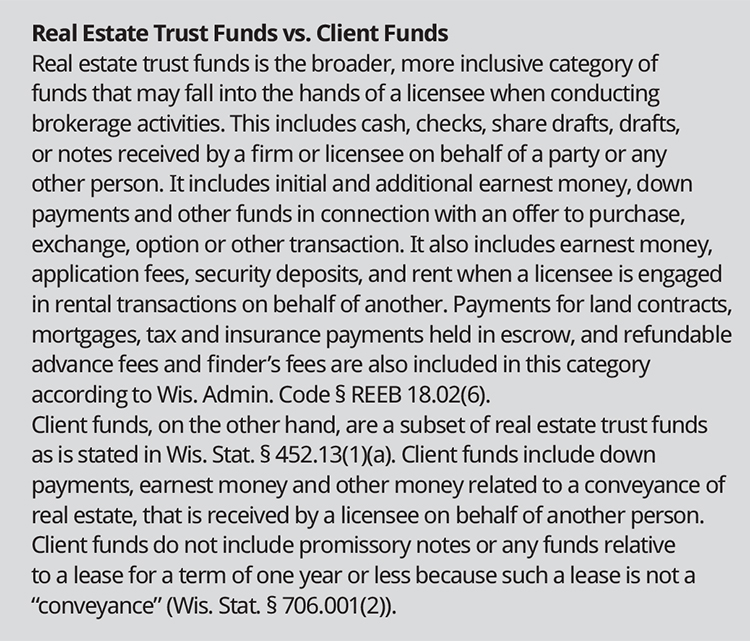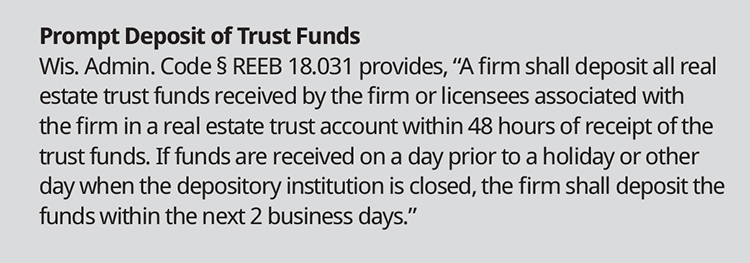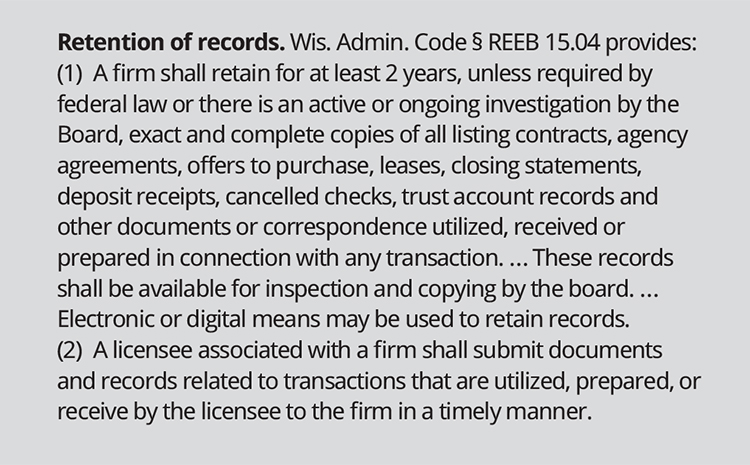Trust accounts are all about the firm holding and safeguarding transaction funds from buyers, tenants and other parties. The firm’s job is to protect the money and make sure it gets to where it legally belongs when the transaction ends. Under Wis. Stat. § 452.133(1)(f), firms providing brokerage services to parties have the duty to safeguard trust funds and other property in accordance with the Wis. Admin. Code chapter 18 rules.
This is not windfall money a licensee might borrow from and use for personal purposes; it is not an easy source for interest-free loans on the sly when nobody is looking. Customers, clients and tenants have placed their sacred trust in the firm and its licensees, and this is not to be taken lightly. If that money is misappropriated, the consequences potentially can involve Real Estate Examining Board (REEB) discipline, loss of license or even criminal charges, because, let’s face it, that would be stealing!
Naturally Wisconsin licensees would never knowingly engage in such behavior and those who run into REEB discipline and other unhappy consequences surely landed there due to a lack of bookkeeping knowledge or accounting skills or other misunderstandings. After all, licensees are not mathematicians! Nonetheless, everyone needs to be on the lookout because these trust account missteps happen a wee bit more often than you might think. The most frequent subject of discipline dispensed by the REEB, other than orders relating to criminal histories or substance abuse, is with regard to trust account violations.
During a 2016 audit of a Wisconsin firm, it was discovered, among other transgressions, the firm had an incorrect name on the trust account and the account was not registered with the Department of Safety and Professional Services (DSPS), the account was not an interest-bearing real estate trust account (IBRETA), the firm failed to prepare a bank reconciliation each month, trial balances were never prepared, and the firm could not account for how much was held for each client or transaction. When you look at the REEB disciplinary decision, certain basic principles come into focus.
Reporting trust accounts to the DSPS
If a firm has a trust account, the account needs to be registered with the DSPS. A firm does not necessarily need to have a trust account – if it can avoid receiving real estate trust funds. The receipt of real estate trust funds triggers the requirement to open a trust account and deposit the funds received therein within 48 hours.
On the other hand, the firm can have as many trust accounts as it wants or needs, but current active accounts each must have a Form 814, Consent to Examine and Audit Trust Account (dsps.wi.gov/Credentialing/Business/fm814.pdf) on file with the DSPS. This form reports the name and number of the account, the name of the depository institution and whether the account is for client funds or for real estate trust funds other than client funds, and must be filed no later than 10 days after opening the account in accordance with Wis. Admin. Code § REEB 18.035(1). The name on the trust account must include the firm name as it appears on the firm’s license or a trade name on file with the DSPS and the words “trust account” must be a part of the account name per § REEB 18.034(1).

If this form is not correctly and timely filed, a firm can be disciplined for several violations. And unfortunately, that may be just the tip of the iceberg.
If the firm holds client funds, those funds must go into an interest-bearing common trust account, commonly referred to as an IBRETA account. If the firm has an IBRETA account, the firm must make sure the bank knows they are to send the interest earned on the account to the department of administration each year before February 1 so those funds may be used for homeless assistance.
Botching the bookkeeping
When it comes to the bookkeeping system for trust accounts, this is an area where many licensees fall short, possibly due to a lack of understanding or neglect. Many times, the list of bookkeeping violations is a litany of the various ways one can fail to complete each of the steps required under Wis. Admin. Code § REEB 18.13.
Admittedly, not every licensee is responsible for bookkeeping chores, but everyone could do with a little accounting 101 refresher! There are five basic steps when maintaining a trust account bookkeeping system:
- Record trust account receipts and disbursements in a journal.
- Post to a ledger.
- Prepare monthly bank reconciliation.
- Prepare a monthly trial balance.
- Compare the trial balance against the reconciliation and the journal balance for accuracy.
Cash journal
The cash journal is the overall chronological record of trust account activity. It is a daily running account of all deposits made and disbursements made in chronological sequence. For funds received, the journal shows the date, the name of the party providing the money, and the amount. For disbursements, the journal shows the date, the payee, the check number and the amount. Each entry must identify the transaction to which it pertains. The journal includes a running balance for each day when receipts or disbursements are entered.
Ledgers
The ledger takes trust account activity and sorts the entries by transaction. It is the separate record of all receipts and disbursements pertaining to an individual transaction between buyer and seller, or landlord and tenant. Ledger entries show the date, payee, check number and amount. The firm shall maintain a separate ledger or separate section of the ledger for each of the various kinds of real estate transactions, including sales and rentals.
Account reconciliation
The firm or a person designated by the firm shall reconcile the real estate trust account or accounts in writing each month unless there has been no activity during the month. The written reconciliation shows the ending account statement balance, the date and amounts of the deposits in transit, the number and amount of checks written but not yet paid by the depository institution as of the ending date shown on the account statement to be reconciled, and the reconciled account statement ending balance. See “Requirements for Real Estate Trust Account Bookkeeping System,” Form #2358, for step-by-step details.
Trial balances
A frequent concern with real estate trust accounts is brokers not doing monthly trial balances of the ledgers. The trial balance should be compared with the reconciled bank statement for the trust account each month. In addition, the trial balance and the reconciled bank statement should be compared with the journal running balance. All three should be equal. A description of these steps appears in “Requirements for Real Estate Trust Account Bookkeeping System,” Form #2358. The step of preparing a trial balance of the ledgers is often overlooked by brokers using electronic bookkeeping programs.
The firm in the example from the 2016 audit was found in violation of Wis. Admin. Code § REEB 18.13 for failing to reconcile the real estate trust account in writing each month; failing to prepare a trial balance; and failing to review the reconciled account statement balance, ledger and journal. The broker was ordered to complete six hours of education on trust accounts, and submit quarterly reports to the DSPS. The broker and the entity each paid costs of $354, and the entity paid a forfeiture of $500.
Is there enough money?
Let’s look at another example. In a prior audit from 2014, there was a broker who did not maintain a cash journal or ledger for each buyer and seller transaction, did not reconcile the bank statement against his records, and never prepared a trial balance. In addition, the broker could not provide assurance that the account had enough money to cover all pending obligations including three to six outstanding checks. In at least two incidences, the broker failed to deposit a check for earnest money within 48 hours or two business days.

The broker generated a receipt for $2,500 of earnest money dated on the 14th of the month even though the deposit occurred on the 21st. The broker also generated a receipt for $500 of earnest money when no corresponding deposit could be found. Although there is no legal requirement to provide receipts for payments, it is a prudent practice in many cases. Under no circumstances, however, should a receipt be issued for anything not actually received. The REEB will likely deem this a demonstration of incompetency to act as a real estate licensee in a manner as to safeguard the interests of the public.
Ouch! That sounds ever so bad when they say that.
The broker did not retain exact and complete copies of all deposit slips or deposit receipts, nor all transactional documents such as the associated listing contracts, offers to purchase, counter-offers, closing statements or agency agreements.
The broker notified the DSPS his trust account was closed, but that account was still open.

Changing or closing accounts
Per Wis. Admin. Code § RL 18.035(2), a firm shall notify the DSPS no later than 10 days after a firm changes a real estate trust account name or number, changes the real estate trust account from one depository institution to another, closes a real estate trust account or changes a real estate trust account to or from an IBRETA account. The notification shall be provided on the Consent to Examine and Audit Trust Account form except when closing a trust account, a firm may inform the board by letter.
The firm in this example, in addition to being found incompetent for failure to safeguard trust funds, was cited for numerous § REEB 18.13 bookkeeping violations, for failing to deposit funds within 48 hours per § REEB 18.031(1), and for failing to retain contract and trust account records as required by Wis. Admin. Code § REEB 15.04. The broker was ordered to complete five hours of financial and office management education, and his license was limited such that he could not have a trust account or handle trust funds, and he paid a forfeiture of $1,000 and costs of $1,550.
Whose money is it?
In a third example, also from a 2014 audit, there were § REEB 18.13 bookkeeping violations as in the other examples. The broker delegated the responsibility to document trust account transactions to his salesperson but failed to adequately supervise the salesperson’s activities.
Broker supervision
Brokers must properly supervise their agents and ensure brokerage services are being provided with reasonable care. Under today’s standards, a firm has no liability for the brokerage services provided by agents associated with the firm if the firm complies with the specific responsibilities stated in Wis. Stat. § 452.132. This would include providing written office procedures and access to a copy of the REEB rules and a supervising broker, and conducting a reasonable review of transaction documents and records, including trust account records. A firm is responsible for the custody and safety of all documents and records relating to transactions submitted to the firm.
Withdrawing commissions earned
The broker also had not returned earnest money to four clients after the transactions failed, and, on multiple occasions, the broker either failed to withdraw commission from the trust account within 24 hours after the transactions were consummated or withdrew more commission from the trust account than he should have. Wis. Admin. Code § REEB 18.09(3)(a) requires a firm withdraw commissions earned from the trust account within 24 hours after transactions are consummated or terminated.
This broker was required by the REEB to complete six hours of trust account education and six hours of education about supervising salespersons, and the broker and business entity each paid costs in the amount of $156.83.
Earnest money not held by firm
Although the REEB-approved offers to purchase outline a procedure for the listing firm to hold earnest money, this is not law and may be modified in the offer. As long as the parties agree and modify the offer, the earnest money may be held by a third party, but the parties should have an escrow agreement. See the article on pages 14-15 of this magazine as well as “So You Don’t Want to Have a Trust Account?” in the February 2016 Wisconsin Real Estate Magazine at www.wra.org/WREM/Feb16/TrustAccounts.
Trust Account Resources
Debbi Conrad is Senior Attorney and Director of Legal Affairs for the WRA.